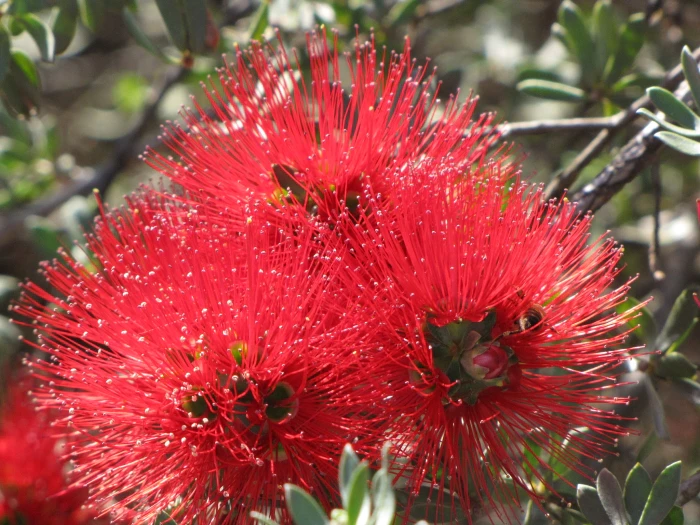Scarlet Kunzea
/
(Kunzea baxteri)
Scarlet Kunzea (Kunzea baxteri)
/

Forest and Kim Starr
CC BY 3.0 us
Image By:
Forest and Kim Starr
Recorded By:
Copyright:
CC BY 3.0 us
Copyright Notice:
Photo by: Forest and Kim Starr | License Type: CC BY 3.0 us | License URL: https://creativecommons.org/licenses/by/3.0/us/deed.en | Uploader: Tyler ser Noche | Publisher: Wikimedia Commons |































Summary
Kunzea baxteri, commonly known as Scarlet Kunzea, is an evergreen shrub native to the coastal plains and rocky outcrops of Southwestern Australia. It typically grows to a height of 1 to 3 meters (3 to 10 feet) and features branches that are more or less hairy. The plant is renowned for its large, scarlet, bottlebrush-like flower clusters that bloom most prolifically from July to September, with possible flowering as late as March depending on rainfall. Each cluster usually contains 16 to 30 flowers at the ends of branches that continue to grow during the flowering period. The fruit is a cup-shaped or urn-shaped capsule. Scarlet Kunzea’s vibrant flowers and attractive form make it a popular choice for ornamental gardens.
Scarlet Kunzea is valued for its striking red flowers and ease of maintenance. It is often used in gardens as a feature shrub or for informal hedging. This kunzea thrives in a Mediterranean climate with dry summers and wet winters but is adaptable to more humid areas and moderate frosts. It requires a sunny or partly shaded location with well-drained soil. It can become drought-tolerant once established. Scarlet Kunzea can be propagated from cuttings grafted onto Kunzea ambigua rootstock. Gardeners should be aware that in some conditions, it may self-seed and become weedy.CC BY-SA 4.0
Scarlet Kunzea is valued for its striking red flowers and ease of maintenance. It is often used in gardens as a feature shrub or for informal hedging. This kunzea thrives in a Mediterranean climate with dry summers and wet winters but is adaptable to more humid areas and moderate frosts. It requires a sunny or partly shaded location with well-drained soil. It can become drought-tolerant once established. Scarlet Kunzea can be propagated from cuttings grafted onto Kunzea ambigua rootstock. Gardeners should be aware that in some conditions, it may self-seed and become weedy.CC BY-SA 4.0
Plant Description
- Plant Type: Shrub
- Height: 11-15 feet
- Width: 11-15 feet
- Growth Rate: Moderate
- Flower Color: Red
- Flowering Season: Spring, Summer
- Leaf Retention: Evergreen
Growth Requirements
- Sun: Full Sun, Part Shade
- Drainage: Fast
Common Uses
Bee Garden, Bird Garden, Butterfly Garden, Drought Tolerant, Fragrant, Hummingbird Garden, Low Maintenance, Showy Flowers
Natural Habitat
Coastal plains and rocky outcrops of Southwestern Australia
Other Names
Common Names:
Scientific Names: Kunzea baxteri, Callistemon hainesii, Callistemon microstachyus, Calothamnus baxteri, Calothamnus spathulatus, Pentagonaster baxteri
GBIF Accepted Name: Kunzea baxteri (Klotzsch) Schauer
